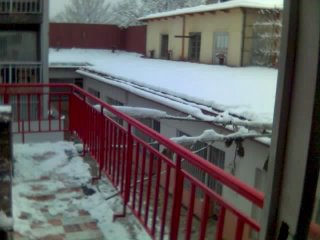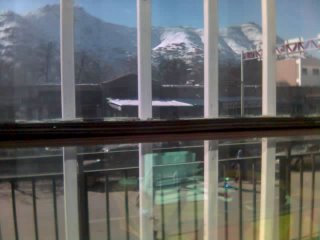
Kabul, at an altitude of 1777m, is the highest of Afghanistan's main cities. You're only likely to get higher when taking a bus to Mazar-e Sharif, and then the Salang Pass takes you to 3363m. Kabul wasn't always the capital city. Originally power was located down south with the Pashtuns in Kandahar, and when the nation of Afghanistan was first created in the mid-eighteenth century that's where its capital was. Surrounded by the peaks of the Hindu Kush mountains, Kabul has drama that other cities lack. It is well known for its precise seasonality, where overnight autumn can become winter - as it did this year when the snow arrived while I was in Khost.
Several things distinguish winter Kabul from summer Kabul. The initial dirt after the first snowfalls (barf-e avval) and the huge puddles that make walking on the street a wet experience. The smell of the city becomes more smoky as people light their gas or wood bukharis, and as the kebab houses fill up with customers. Several days after the first snow, pathways and pavements are filled with compacted ice, treacherously slippy for the wrong sort of shoes.
Traffic is still a serious problem for the city authorities. Huge traffic jams mean that during most of the working day (between 9.30 and 5) you're likely to spend most of your time at a standstill. Indeed almost always it is quicker to walk. And taxi fares have increased on account on the higher petrol prices (since about two months ago). The traffic problems are partly caused by the big barrels and drums that NGOs position outside their offices to deter suicide bombers in cars. This slows traffic down, and President Karzai has resorted to issuing a decree that requires all roads in Kabul to be free of such obstacles by this Sunday. From Monday onwards they'll be removed, the order states. Some NGOs have expressed resistance to this. See BBC News website for a story on this.
It is less and less common to see omen walking in full-blue burqa, the total-body cover ubiquitous during Taliban times, in the streets of downtown Kabul. Mostly, though, veils are still worn, even if liberties are taken as to exactly how much hair is covered on the top of the head. Dress is also more western, with jeans tending to be the norm, especially amongst the young. Women have long been present on television as presenters and music-video DJs.
The dialect of Dari spoken here is quite easy for me to understand. Being a capital city, though, people seem very busy and tend to have less time for tea and chit-chat, particularly amongst shopowners and government offices.
In my hotel, the Mustafa, there are few people. I've met one or two tourists - a man from the UK, as well as a Korean boy who checked in last night - but mostly it's contractors who're still here over the winter period. Power-cuts are frequent and unwelcome. More about this later. The staff of the hotel remain helpful and always good fun, from Wais Abdullah the manager, down to Najiib who took a job here in order to improve his English. Each morning I give thanks for the absolute luxury of a warm shower (absent from my travels elsewhere in the country) and the chance to wash my hair. Small pleasures...
Foreigners may be found all over town. Mostly living in Wazir Akbar Khan area, their large 4x4 vehicles are a common sight. It's quite uncommon for me to see foreigners walking on the streets, largely due to the security restrictions that management imposes upon them. This means that often NGOs are merely confined to living behind huge barbed-wire fences and bomb-resistant walls full of sandbags. The restaurants in Wazir Akbar Khan remain popular in the evenings, from the Lai Thai restaurant and its charming owner Lalita to The Elbow Room, one of the most popular bars in town.
Electricity problems dog the city, though. Four years after the ousting of the Taliban, most residents are without power, except for five hours every second or third night. Although hundreds of millions of dollars in foreign aid have been spent to fix the problem, conditions have worsened in the past year as improvements have lagged and the population surges. Government officials say things will not noticeably improve until at least 2008, when new power lines are to be completed.
The gulf between the wealthy few and the literally powerless majority is especially striking now, as pockets of opulence sprout across the impoverished capital of 4 million.
Across the city, in a dilapidated district called Dai Mazang, live those on the dark side of Afghanistan's economic fortunes. Although the country's gross domestic product has doubled since 2001, roughly 30 percent of the population is unemployed, and 37 percent need donated food to survive, according to statistics compiled by the Brookings Institution in Washington. In Dai Mazang, 65 families have taken up makeshift residence in the carcasses of former government office buildings that were destroyed by rocket attacks in the civil war of the 1990s. Most were refugees in Pakistan and Iran who returned home after 2001, lured by promises of jobs and land that never materialised.
Energy experts here said the situation would not improve until October 2008, when power lines from Uzbekistan, now being laid across the snow-capped Hindu Kush, are expected to be completed.
People stand outside the embassies of Pakistan and Iran overnight in the sub-zero temperatures, in the hope that they'll be able to travel to their families for Eid celebrations which are due to begin in the next week or so.
Kabul, too, then is all-a-bustle as people prepare to travel back home to north and south. Aside from some new buildings here and there, not a great deal has changed in town since summer.
Several things distinguish winter Kabul from summer Kabul. The initial dirt after the first snowfalls (barf-e avval) and the huge puddles that make walking on the street a wet experience. The smell of the city becomes more smoky as people light their gas or wood bukharis, and as the kebab houses fill up with customers. Several days after the first snow, pathways and pavements are filled with compacted ice, treacherously slippy for the wrong sort of shoes.
Traffic is still a serious problem for the city authorities. Huge traffic jams mean that during most of the working day (between 9.30 and 5) you're likely to spend most of your time at a standstill. Indeed almost always it is quicker to walk. And taxi fares have increased on account on the higher petrol prices (since about two months ago). The traffic problems are partly caused by the big barrels and drums that NGOs position outside their offices to deter suicide bombers in cars. This slows traffic down, and President Karzai has resorted to issuing a decree that requires all roads in Kabul to be free of such obstacles by this Sunday. From Monday onwards they'll be removed, the order states. Some NGOs have expressed resistance to this. See BBC News website for a story on this.
It is less and less common to see omen walking in full-blue burqa, the total-body cover ubiquitous during Taliban times, in the streets of downtown Kabul. Mostly, though, veils are still worn, even if liberties are taken as to exactly how much hair is covered on the top of the head. Dress is also more western, with jeans tending to be the norm, especially amongst the young. Women have long been present on television as presenters and music-video DJs.
The dialect of Dari spoken here is quite easy for me to understand. Being a capital city, though, people seem very busy and tend to have less time for tea and chit-chat, particularly amongst shopowners and government offices.
In my hotel, the Mustafa, there are few people. I've met one or two tourists - a man from the UK, as well as a Korean boy who checked in last night - but mostly it's contractors who're still here over the winter period. Power-cuts are frequent and unwelcome. More about this later. The staff of the hotel remain helpful and always good fun, from Wais Abdullah the manager, down to Najiib who took a job here in order to improve his English. Each morning I give thanks for the absolute luxury of a warm shower (absent from my travels elsewhere in the country) and the chance to wash my hair. Small pleasures...
Foreigners may be found all over town. Mostly living in Wazir Akbar Khan area, their large 4x4 vehicles are a common sight. It's quite uncommon for me to see foreigners walking on the streets, largely due to the security restrictions that management imposes upon them. This means that often NGOs are merely confined to living behind huge barbed-wire fences and bomb-resistant walls full of sandbags. The restaurants in Wazir Akbar Khan remain popular in the evenings, from the Lai Thai restaurant and its charming owner Lalita to The Elbow Room, one of the most popular bars in town.
Electricity problems dog the city, though. Four years after the ousting of the Taliban, most residents are without power, except for five hours every second or third night. Although hundreds of millions of dollars in foreign aid have been spent to fix the problem, conditions have worsened in the past year as improvements have lagged and the population surges. Government officials say things will not noticeably improve until at least 2008, when new power lines are to be completed.
The gulf between the wealthy few and the literally powerless majority is especially striking now, as pockets of opulence sprout across the impoverished capital of 4 million.
Across the city, in a dilapidated district called Dai Mazang, live those on the dark side of Afghanistan's economic fortunes. Although the country's gross domestic product has doubled since 2001, roughly 30 percent of the population is unemployed, and 37 percent need donated food to survive, according to statistics compiled by the Brookings Institution in Washington. In Dai Mazang, 65 families have taken up makeshift residence in the carcasses of former government office buildings that were destroyed by rocket attacks in the civil war of the 1990s. Most were refugees in Pakistan and Iran who returned home after 2001, lured by promises of jobs and land that never materialised.
Energy experts here said the situation would not improve until October 2008, when power lines from Uzbekistan, now being laid across the snow-capped Hindu Kush, are expected to be completed.
People stand outside the embassies of Pakistan and Iran overnight in the sub-zero temperatures, in the hope that they'll be able to travel to their families for Eid celebrations which are due to begin in the next week or so.
Kabul, too, then is all-a-bustle as people prepare to travel back home to north and south. Aside from some new buildings here and there, not a great deal has changed in town since summer.



0 Comments:
Post a Comment
<< Home